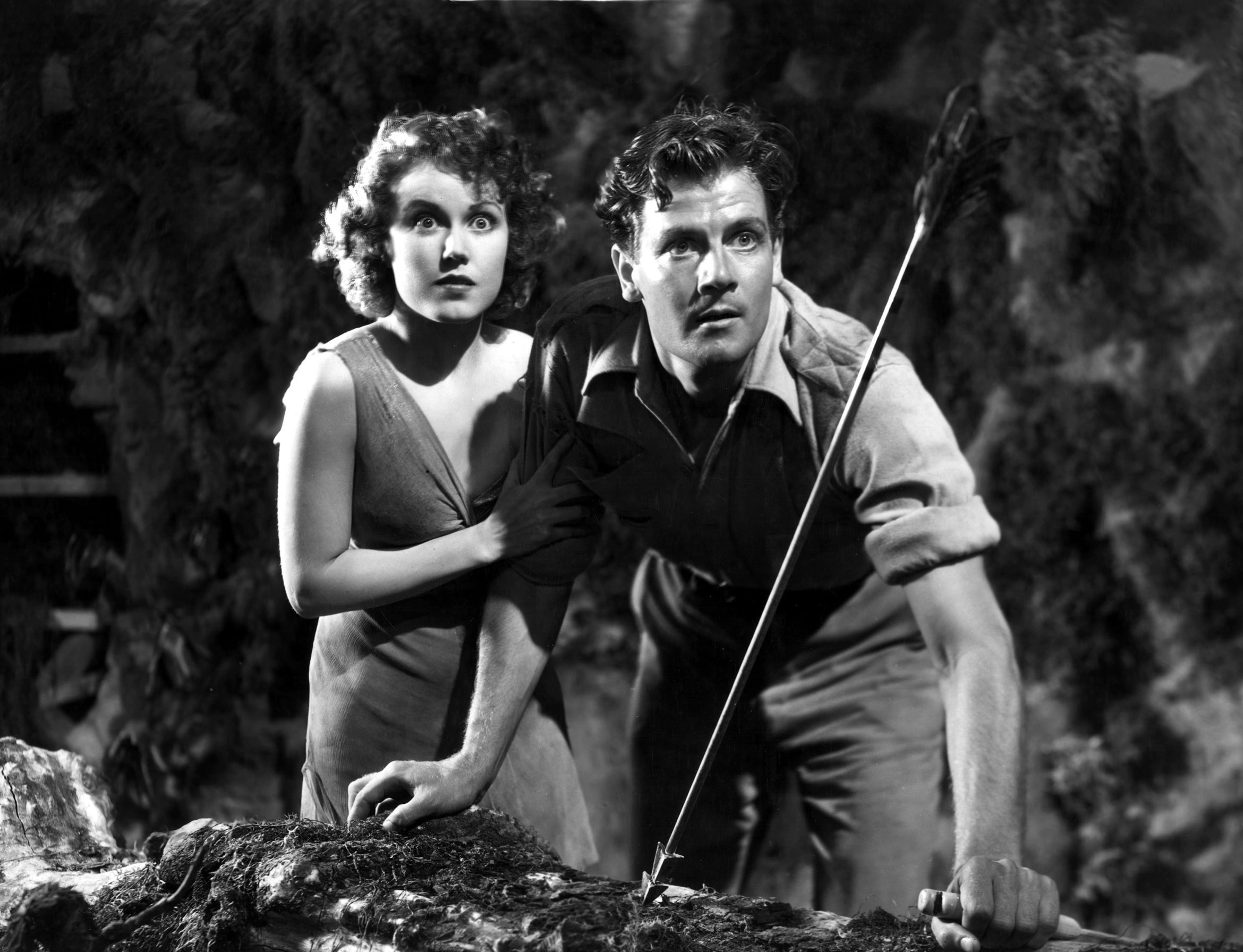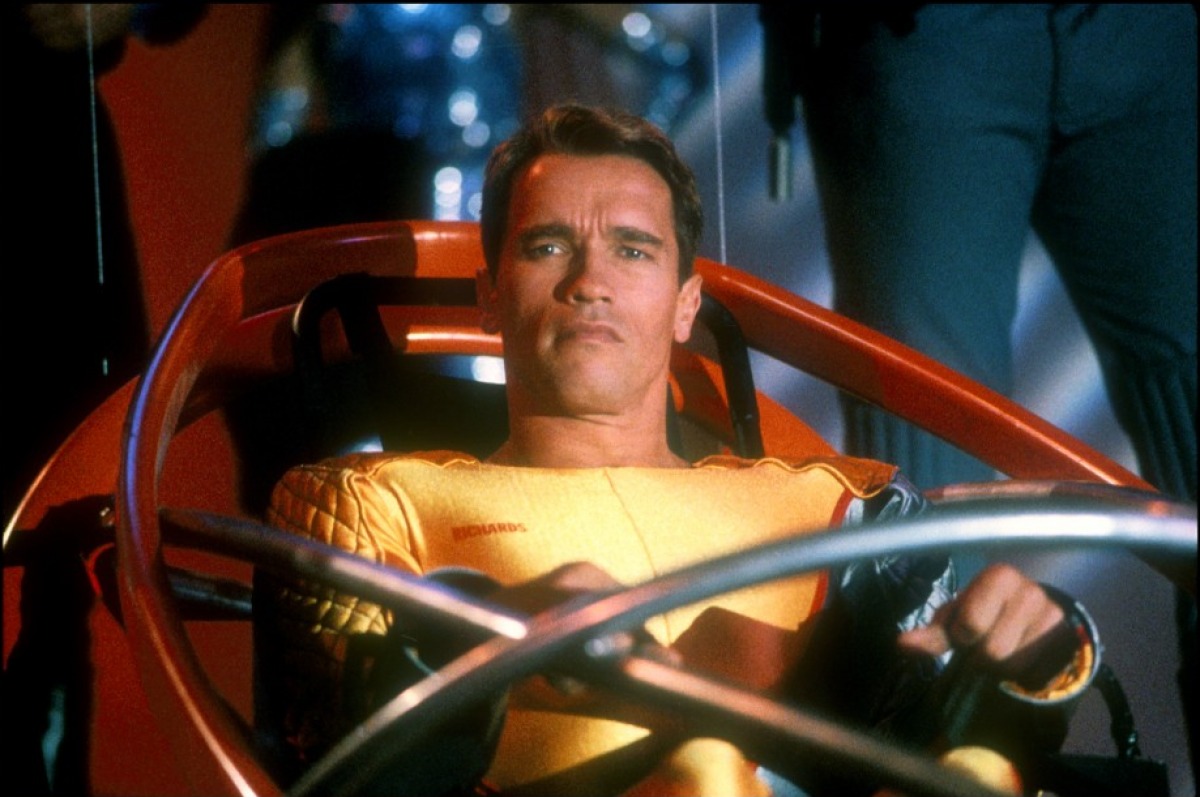Human Bloodsports and Death Games refers to games whereby people are forced to fight for their lives (usually with their bare hands). Central to treatments of the theme is the idea of humans treated as game and hunted usually by aesthetes who prize the hunt/fight, or where this is staged on behalf of bored elites (or more recently snuff internet audiences).
This also refers to gladiatorial combat in which armed combatants are required to fight to the death in an arena for the sporting pleasure of others. There have been a reasonable number of films set in futures where human bloodsports and to-the-death games are staged for televised masses.
Most Dangerous Game Scenarios
The progenitor of the human bloodsports game is the short story The Most Dangerous Game (1924) by Richard Connell, which concerns Count Zaroff, a Russian aristocrat who takes great enjoyment in pursuing human game across his private island in the same way that big game hunters hunt trophy animals only for a single hunter to triumph and fight back. This underwent a classic film treatment as The Most Dangerous Game (1932). In the film, Zaroff chooses a couple who have been shipwrecked on his island (something he has staged) and pursues them with dogs and guns where their ability to improvise with their bare hands actually ends up turning the tables against him.
There have been a number of remakes – A Game of Death (1945) and Run for the Sun (1956), where Zaroff’s Russian aristocrat more topically becomes a Nazi, and The Most Dangerous Game (2017) and The Most Dangerous Game (2022), as well as uncredited copies such as Bloodlust (1961), The Woman Hunt (1973) and Seven Women for Satan (1976).
There have been a number of variants on the Most Dangerous Game scenario with Desecrated (2015) and Carnage Park (2016). In the modern era, the basic premise has been readily adapted to the action film with the likes of Avenging Force (1986), Deadly Prey (1987), Death Ring (1993), Hard Target (1993), Surviving the Game (1994), 10+01 (2003), The Eliminator (2004), The Condemned (2007) and Darkweb (2016).
The early 2020s has been a surprising resurgence of the theme in a number of low to medium-budgeted films such as American Hunt (2019), Apex (2021), Prey (2021), Hunting Ava Bravo (2022), Death Hunt (2022) and Hunt Club (2022).
There are also a body of films about serial killers who enjoy hunting victims as game as in the likes of The Hunted (2003), Dark Highlands (2018), Hunted (2020), The Silencing (2020) and the tv series Dexter: New Blood (2022). This has even had a real world equivalent in the form of Alaskan serial killer Robert Hansen who operated during the 1980s whose story is depicted in the film The Frozen Ground (2013).

Hard Target, Surviving the Game and Happy Hunting show the rich hunting the homeless and alcoholics. Happy Hunting (2017) concerns a borderland town that stages a hunt to eliminate the most socially worthless. Desierto (2015) features Mexican illegals being hunted by a vigilante after crossing the US border. Hounded (2022) shows the British aristocracy turning to hunting petty criminals following the cancellation of the fox hunt.
The Hunt (2020) is a darkly satiric variant where liberal elites abduct and hunt conservative rednecks and reactionaries. On the other side of the coin, Parasites (2016) features college students hunted by homeless people, while in Run Hide Fight (2020) we have students hunted by school shooters. Prey for Death (2015) sets the scenario in a Western setting.
One notable variation was Predator (1987), which replaces Count Zaroff with an alien who enjoys hunting human game. This has led to a number of sequels with Predator 2 (1990), Predators (2010), The Predator (2018) and Prey (2022), and crossovers with the Alien franchise with AVP: Alien vs Predator (2004) and AVPR: Aliens vs Predator Requiem (2007). There was also the cheap copy Star Hunter (1995), while there was an earlier version of the idea with Without Warning (1980). Slave Girls from Beyond Infinity (1987) relocates The Most Dangerous Game on another planet.
Tongue was planted in cheek with the French variant Girls With Balls (2018) in which a girls volleyball team face off against hunters and Get Duked!/Boyz in the Wood (2019) with four inept youths hunted through the Scottish Highlands by aristocrats determined to cull the herd of useless youth. In more exotic variants, Shark Week (2012) has a group forced to defend against a druglord who makes them fight killer sharks.
There have been a surprising number of variants on The Most Dangerous Game scenario in tv shows with the likes of the Get Smart episode Island of the Darned (1966), the Logan’s Run episode Capture (1977), The Incredible Hulk episode The Snare (1978), The A-Team episode Pros and Cons (1983), the Xena: Warrior Princess episode Dangerous Prey (2001), the Relic Hunter episode Run Sydney Run (2001), the Supernatural episode The Benders (2006), the Criminal Minds episode Open Season (2007) and the Dollhouse episode The Target (2009).
Future Death Games
The other side of the coin is the depiction of future societies where gladiatorial combat or barehands survival against armed hunters is televised for the masses. The first of these was the satirical The Tenth Victim (1965) about a tv show that follows contestants as they eliminate each other until one remains a winner. Peter Watkins’ The Gladiators/The Peace Game (1969) concerned televised war game scenarios held between nations as a means of preventing war.
Peter Watkins also made Punishment Park (1971), a highly politicised film with a tv camera crew following criminals as they make a run across a desert to freedom only to be picked off and killed by pursuing law enforcement. The Australian Turkey Shoot (1983) offers a less serious variant where the inmates in a future prison are offered a chance to get to freedom as they are hunted by a bored elite.
The big-budget Rollerball (1975) featured the title game, an ultra-violent mix of motocross, pro-football and gladiatorial games that has become the most popular sport in the world and is televised as a means to quell the masses until James Caan’s hero seeks individualism. Roger Corman produced the satirical copy with Death Race 2000 (1975) about a future road race where contestants earn points by running people over. Both of these have been remade as Rollerball (2002), the non-satirical Death Race (2008), which spawned a series of sequels, and Death Race 2050 (2017).

Other futures that conduct death games and gladiatorial combat appear in films such as Endgame (1982), The Prize of Peril (1983), the Max Headroom episode Rakers (1987), Temmink: The Ultimate Fight (1998), Tekken (2010), Manborg (2011), the remakes of Death Race and Turkey Shoot (2014), Andron (2015) and Mafia: Survival Game (2016). Most of these depict popular television shows featuring to-the-death sports where people are hunted and/or have to fight to the death. RPG (2013) features people in a Virtual Reality death game to win a younger body, while in Virtual Death Match (2020) contestants face various horror tropes in a VR death game. In Dual (2022), a person and their clone are forced to fight in televised gladiatorial combat for ownership of the original’s life.
The popular hit among these was The Running Man (1987) with Arnold Schwarzenegger as a prisoner defending himself against killers in a televised death match where he becomes an unexpected hero. The most successful iteration of this in recent years was the mega-success of The Hunger Games (2012) and sequels where to-the-death-combat between teens is held as entertainment in the future.
Series 7: The Contenders (2001) was a sharp and witty contemporary-set prefigual of what became the reality tv show that follows contestants who are assigned to eliminate each other.
We see death combat games being conducted for amusement in post-apocalyptic futures in the Planet of the Apes tv series episode The Gladiators (1974) and films like Deathsport (1978), Escape from New York (1981), Mad Max Beyond Thunderdome (1985), Stake Land II (2016) and The Domestics (2018). Both Zombie Fight Club (2014) and Peninsula (2020) show these games being staged in the middle of a zombie apocalypse.
Contemporary Bloodsports and Games
There are a number of contemporary variations on this. One of these is of secret organisations that hold death games. The non-genre Bruce Lee hit Enter the Dragon (1973) popularised the premise of the wealthy individual (or super-villain) who holds a combat tournament on his private island. This idea has been copied by films like Kill or Be Killed (1976), The Lost Empire (1983), Mortal Kombat (1995) and The Quest (1996).
The illegal combat tournament is a popular trope in the Action Film – one example included here is in The Swordsman (1992). Forced to Kill (1993), Death Warrior (2009), Raze (2013), 31 (2016), Headgame (2018) and Solum (2019) feature people who are abducted and forced to compete in deathsports and elimination games. Corbin Nash (2018) feature such games run by vampires.
In other variants, The Belko Experiment (2016) has the workers at an office building being required to slaughter each other until one survives as part of an experiment. The Australian The Clinic (2010) features pregnant women abducted and placed in a maze where they must kill each other to get their babies back. Spare Parts (2020) features members of a girl punk band who are abducted and their arms replaced with weapons attachments and they then forced to participate in gladiatorial games. In Dinosaur Hotel (2021), people compete for cash prizes while hunted through a hotel by dinosaurs.

The Japanese Battle Royale (2000) has rebellious school children are dealt with by being placed on an island and given weapons to eliminate each other. The influence of Battle Royale can also be seen in other Japanese films like Cinderella Game (2016), where twenty schoolgirls are abducted and taken to an island in a series of elimination rounds decided by a card game, and Chronicle of the After School Wars (2018).
The biggest success in recent years has been the South Korean tv series The Squid Game (2021- ) about contestants who are selected to enter into a secret game where the winner will receive a large haul of cash but doing requires them to pass through a deadly series of variations on children’s game where the loser is executed. A similar idea also appeared around the same time in the Japanese tv series Alice in Borderland (2020- ). The ideas of contestants in deadly children’s games also appeared in The OctoGames (2022).
13 Tzameti (2005) and its English-language remake 13 (2010) concern an underground club where people can bet on games of Russian Roulette, while Russian Roulette games also feature in scenes in Shadow Hours (2000) and The Domestics. Cheap Thrills (2013) concerns a man who offers money to two unemployed men on a series of increasingly more extreme bets.
In The Condemned and Darkweb, we see human hunts being staged for snuff internet audiences. Other films feature the torture and suffering of others being transmitted by the internet. Untraceable (2008) features victims being tortured on snuff internet sites depending on the number of likes.
Other variants include a number of films about mobile games that require people to go to greater extremes or where they are forced to participate as in 13 Sins (2014), Nerve (2016) and Level Up (2016). Escape Room (2019) features people placed in an increasingly more extreme series of escape rooms for the amusement of others.
Intergalactic Gladiatorial Combat
There is also the theme in science-fiction of an individual or individuals who are chosen to represent humanity in intergalactic gladiatorial combat. Often the fate of the Earth hangs in the balance of the outcome. This was popularised by the Star Trek episodes Arena (1966) and The Savage Curtain (1969) and also turns up in Mortal Kombat (1995) and assorted sequels, the comedy Lazer Team (2015) and Jiu Jitsu (2020).
There are also several earthbound variations on this where nations of the world agree to settle their political differences by having selected combatants fight it out with the outcome riding on who wins. This can be seen in The Gladiators/The Peace Game (1969), The Challenge (1970) and in Robot Jox (1990), which has the outcome fought by human-piloted giant robots.
The Star Trek episode The Gamesters of Triskelion (1968), the Mortal Kombat films, Planet Hulk (2010) and Thor: Ragnarok (2017) feature gladiatorial games held between alien species on other worlds. The Star Trek episode Bread and Circuses (1968) features televised gladiatorial games on a planet that has recreated the Roman Empire. In the Doctor Who episode The War Games (1969), soldiers have been plucked from different Earth historical eras to fight in endless war simulations. In Justice League: Warworld (2023) various DC superheroes are placed in a planetwide combat simulation, while in Teen Titans Go! vs Teen Titans (2019), the Titans are forced to fight other versions of themselves from the multiverse.
The Human Race (2013) features people abducted from all walks of life by aliens and forced to run around a deadly track until only one survivor remains. The animated To Your Last Death (2019) has a family facing killers in an office building while intergalactic gamesters bet on the outcome, frequently interfering to rerun the game or change the rules.
Another oddity is Hellkat (2021), which features an MMA fighter forced to compete against demons and other entities in the afterlife.
Recommendations
- The Most Dangerous Game (1932)
- The Gladiators/The Peace Game (1969)
- Punishment Park (1971)
- Death Race 2000 (1975)
- Rollerball (1975)
- The Prize of Peril (1983)
- Predator (1987)
- Hard Target (1993)
- Battle Royale (2000)
- Series 7: The Contenders (2001)
- 13 Tzameti (2005)
- Raze (2013)
- The Belko Experiment (2016)
- The Hunt (2020)
- The Squid Game (tv series, 2021- )
A full list of titles can be found here Human Bloodsports